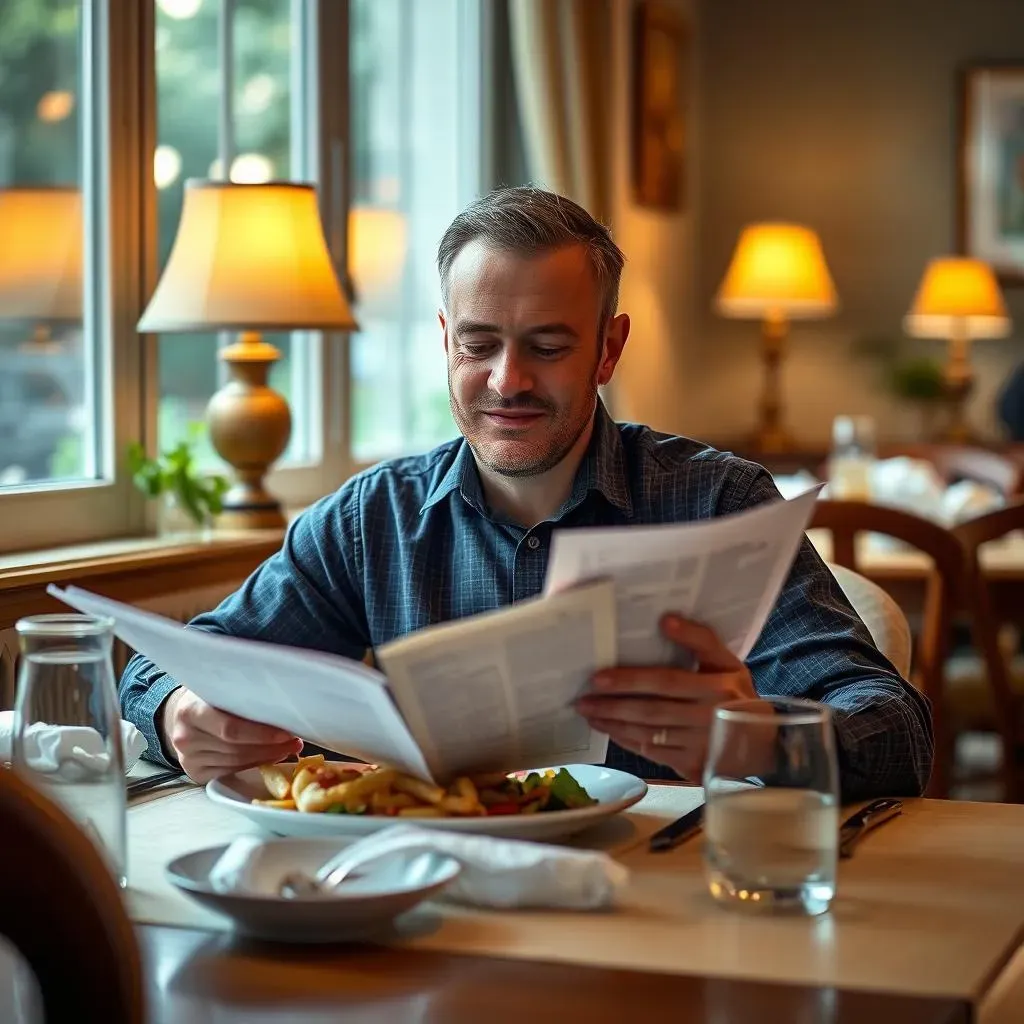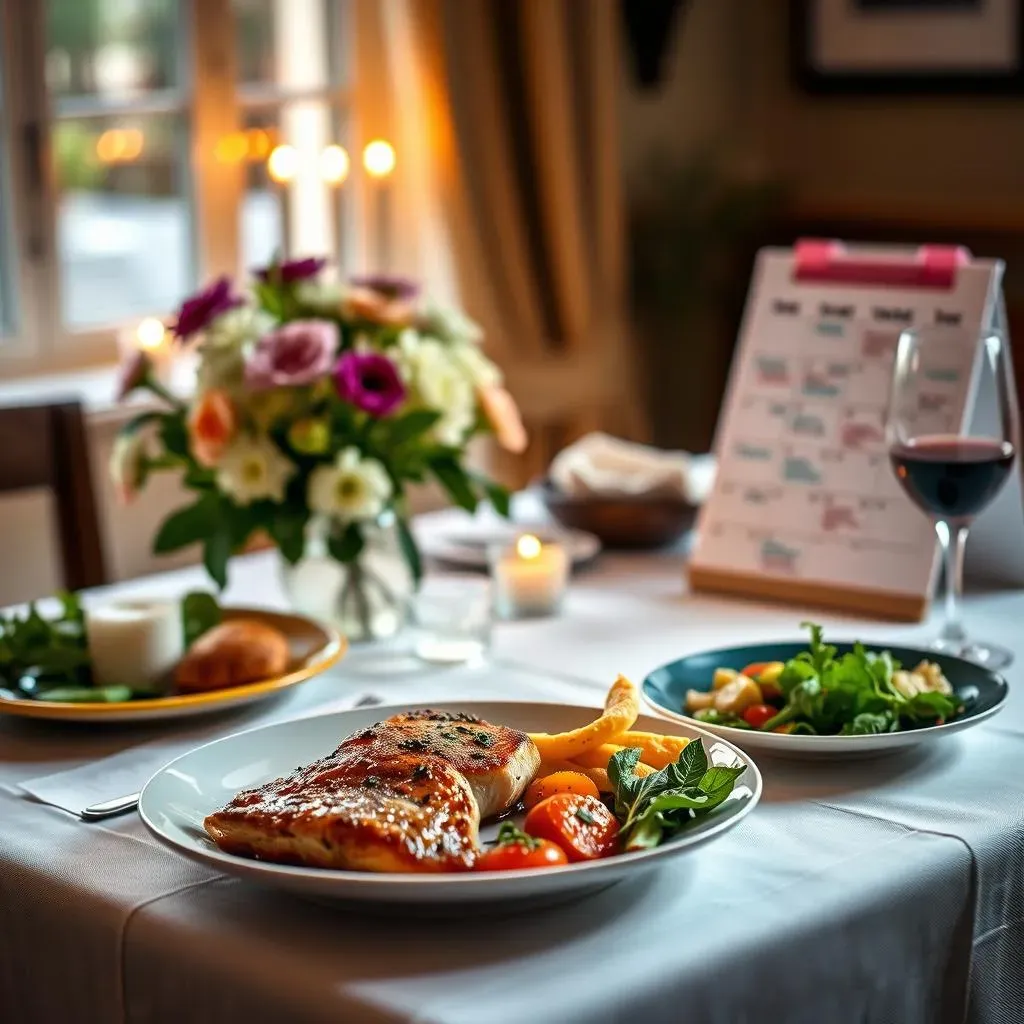Table of Contents
Ever found yourself staring at the clock, wondering, "what is the best time to have your dinner?" It's a question that pops into many minds, and the answer isn't as straightforward as you might think. We all have different schedules, different metabolisms, and different goals. Some of us are trying to shed a few pounds, others want to avoid that dreaded late-night heartburn, and some just want to figure out a routine that feels right. This article isn't about strict rules or one-size-fits-all advice. Instead, we're going to explore what science says about meal timing, how it impacts your body, and how to personalize your dinner schedule to fit your unique needs. We'll look at the best time to eat for weight loss, consider acid reflux, and discuss how mindful eating plays a huge role. Get ready to ditch the dinner-time stress and find a rhythm that works for you.
Is There a Best Time to Eat Dinner?

Is There a Best Time to Eat Dinner?
The Great Dinner Debate
So, you're wondering if there's a magic hour to eat dinner, huh? It's a question that's been bugging people for ages, and honestly, there's no single, perfect answer. What works wonders for one person might be a total disaster for another. It's not like there's a giant clock in the sky telling us when to chow down. Instead, it's more about figuring out what aligns with your body's natural rhythms and your daily routine. Think of it like finding the right pair of shoes; what feels great on your feet might be torture for mine. We are all different.
But before you throw your hands up in confusion, it's not all chaos. There are some general guidelines based on research and common sense that can point us in the right direction. We need to consider things like how our bodies digest food, how our sleep cycles work, and even our individual health goals. It's not about being rigid and following some strict schedule, but rather about being aware of how timing can impact your well-being. We're going to unpack all this, so you can find a dinner time that feels good and fuels you, not the other way around.
Individual Rhythms and Needs
The truth is, our bodies are all a bit different. Some people are early birds, naturally waking up with the sun and ready for breakfast at dawn. Others are night owls, feeling most energetic when the rest of the world is winding down. These differences, largely dictated by our internal clocks (also known as circadian rhythms), influence how our bodies process food and use energy. So, a dinner time that works great for an early riser might feel awful for a night owl. It's about knowing your body and its unique rhythm.
Then you have to factor in your individual needs. Are you trying to lose weight? Do you struggle with acid reflux? Do you have a demanding work schedule that throws your meal times off? All of these things play a part in finding the best time for you to eat dinner. There's no one-size-fits-all solution, and that's okay. It's about being flexible and adjusting your routine to fit your life, not the other way around. So, let's get into the specifics and find what works for you.
Factor | Description |
|---|---|
Circadian Rhythm | Your body's internal clock, influencing when you feel most alert and hungry. |
Health Goals | Whether you're trying to lose weight, manage a condition, or just feel better overall. |
Daily Routine | Your work schedule, family commitments, and other activities that affect when you can eat. |
The Science Behind Meal Timing and Your Body

The Science Behind Meal Timing and Your Body
Your Internal Clock: The Circadian Rhythm
so let's talk about your body's internal clock, or what scientists call the circadian rhythm. It's like a 24-hour cycle that regulates all sorts of things, from when you feel sleepy to when you feel hungry. This rhythm is heavily influenced by light and darkness, which is why your sleep schedule is often tied to the sun. But it also affects your digestion, hormone levels, and even your metabolism. When you eat is not just about filling your belly; it's about working with this natural rhythm. When you eat late at night, you might be going against your body's natural process, which can lead to some not-so-great side effects.
Think of it like this: your body has different "shifts" throughout the day. During the day, it's geared up for activity and digestion. At night, it's winding down, focusing on rest and repair. Eating a big meal late at night is like asking your body to work overtime when it's trying to relax. This can cause digestive issues, disrupt your sleep, and even mess with your weight. It’s not about being a robot and sticking to a strict schedule, but understanding how your body naturally functions can help you make smarter choices about when you eat.
How Digestion and Metabolism Play a Role
Now, let’s get into the nitty-gritty of digestion and metabolism. When you eat, your body breaks down food into energy and nutrients. This process isn't constant; it's affected by your circadian rhythm. Your digestive system is most efficient during the day when you’re active. It’s like a well-oiled machine that works best when it's running at its normal pace. Eating late at night, when your body is slowing down, can lead to indigestion, bloating, and even that uncomfortable feeling of food just sitting in your stomach.
Your metabolism, which is how quickly your body burns calories, also changes throughout the day. It's generally higher during the day when you're moving around and lower at night when you're resting. So, eating a big meal right before bed means your body is less efficient at burning those calories. This can contribute to weight gain over time. It is important to understand that it is not just about what you eat, but when you eat it as well. It’s a bit like trying to start a car with a nearly empty tank, it just won't work that well.
Body Process | Daytime | Nighttime |
|---|---|---|
Digestion | Most efficient | Slows down |
Metabolism | Generally higher | Generally lower |
Hormone Levels | Optimized for activity | Optimized for rest |
What Is The Best Time to Eat Dinner for Weight Loss and Health?

What Is The Best Time to Eat Dinner for Weight Loss and Health?
The Early Bird Gets the... Better Metabolism?
So, you're on a quest for weight loss and better health, and you're wondering if dinner time plays a role? Well, it does! Eating earlier in the evening seems to be beneficial for a lot of people. When you eat closer to sunset, you're more in sync with your body's natural rhythms. Your metabolism is usually more active earlier in the day, which means you're better able to process the food you eat. Think of it like this, your body is a furnace. It burns fuel most efficiently when it's warmed up and ready to go, not when it's winding down for the night.
There are some studies suggesting that eating a larger portion of your daily calories earlier in the day is linked to better weight management. This doesn’t mean you have to eat everything by noon, but having a good-sized dinner a few hours before bed can make a difference. When you eat late, your body has less time to digest the food before you hit the hay, and that can lead to less efficient calorie burning. Plus, it can disrupt your sleep, and we all know how important sleep is for overall health and weight management. It's all connected, you see.
The Late-Night Snack Attack Trap
One of the biggest reasons why late dinners aren't great for weight loss is that they often lead to late-night snacking. If you eat dinner late, you're more likely to feel hungry again before bed. This can lead to unhealthy choices, like grabbing chips, sweets, or other high-calorie snacks. Those extra calories add up, and they are not doing you any favors. Eating earlier can help you avoid that late-night temptation and give your body a break before bedtime. It’s about creating a routine that supports your health goals, not sabotaging them.
It's not just about the calories, though. Late-night eating can also mess with your sleep quality. When your body is busy digesting food, it's not fully focused on rest and repair. This can lead to restless nights, and we know how important a good night's sleep is for weight loss and overall health. It's a vicious cycle, and we want to break free from it. Earlier dinners can be a great first step in that direction.
Benefit of Earlier Dinners | Explanation |
|---|---|
Better Metabolism | Your body burns calories more efficiently earlier in the day. |
Reduced Late-Night Snacking | Eating earlier can help prevent unhealthy cravings before bed. |
Improved Sleep Quality | Proper digestion allows for a more restful night's sleep. |
Finding Your Sweet Spot
So, what's the magic hour? Well, it's not a set time for everyone, but a good general guideline is to aim for dinner at least 2-3 hours before you go to bed. This gives your body enough time to start the digestion process before you lie down. If you typically go to bed at 10 pm, then try to have dinner around 7 pm or 8 pm. It’s about finding a window that works for your schedule. It’s not about perfection, it’s about progress.
Now, this isn’t a rigid rule you should follow to a T. Life happens, and sometimes you might have to eat dinner later than usual. The main thing is to be consistent as much as possible. Try to make earlier dinners part of your regular routine and see how it affects your weight and energy levels. It’s about making small changes that add up over time. So, start experimenting and see what works best for you. Remember, it's your journey, and you get to decide what works best for your body.
Practical Tips for Finding Your Perfect Dinner Time

Practical Tips for Finding Your Perfect Dinner Time
Alright, so you're ready to nail down that perfect dinner time, huh? It's not about being a robot, but more about finding a rhythm that works for your body and your life. Start by tuning into your body's hunger cues. Are you actually hungry, or are you just bored or stressed? Eat when you're genuinely hungry, not just because it's "dinner time." Then, think about your schedule. What time do you usually go to bed? Aim to have dinner at least 2-3 hours before that. If you're a night owl, this might mean a later dinner than someone who's in bed by 10 pm. It's all about personalizing it to your needs.
Try experimenting with different dinner times. Move your mealtime by 30 minutes earlier or later for a week and see how you feel. Are you sleeping better? Do you have more energy during the day? Are you experiencing less digestive discomfort? Keep a journal to track how different times affect you. This isn’t just about eating a meal; it’s about learning to listen to your body. It’s not about being perfect, it’s about figuring out what works best for you and your unique needs. Remember, there's no one-size-fits-all approach, so be patient with yourself.
- Tune into Your Hunger Cues: Eat when you're truly hungry, not just out of habit.
- Consider Your Bedtime: Aim for dinner 2-3 hours before you go to sleep.
- Experiment with Timing: Try shifting your dinner time by 30 minutes to see how you feel.
- Keep a Journal: Track how different dinner times impact your sleep, energy, and digestion.
Also, think about what you're eating for dinner. A big, heavy meal right before bed is likely going to disrupt your sleep and digestion, no matter what time you eat it. Instead, try to opt for a balanced meal that's rich in nutrients. Focus on lean proteins, vegetables, and complex carbs. Avoid sugary or processed foods, especially late at night. Your body will thank you for it. It's about making smart choices, not just about when you eat. It’s about giving your body what it needs to thrive.
And finally, be flexible. Life happens, and sometimes you'll have to eat dinner later than you planned. Don't stress about it. Just try to get back on track as soon as possible. The key is consistency, not perfection. If you miss a day, don't throw in the towel and give up. Just get back to your routine the next day. It's about making sustainable changes that fit into your life, not just following a set of rules. Finding the perfect dinner time is a journey, not a destination.
Tip | Description |
|---|---|
Balanced Meals | Focus on lean proteins, veggies, and complex carbs. |
Avoid Sugary Foods | Limit processed foods and sugary snacks, especially late at night. |
Be Flexible | Don't stress about occasional late dinners; get back on track when you can. |
Wrapping Up: Finding Your Ideal Dinner Time
So, what's the final word on "what is the best time to have your dinner"? It turns out, there isn't a magic number that works for everyone. The ideal dinner time is a personal puzzle, pieced together by your lifestyle, health goals, and how your body responds. The key takeaways? Pay attention to your hunger cues, aim for a few hours before bedtime, especially if weight loss or acid reflux is a concern, and choose nutrient-rich foods. Don't get caught up in rigid schedules. Instead, embrace flexibility and mindful eating. Your perfect dinner time isn't about following a clock; it's about listening to your body and nourishing it well. Ultimately, the best time for dinner is whenever it helps you feel your best.